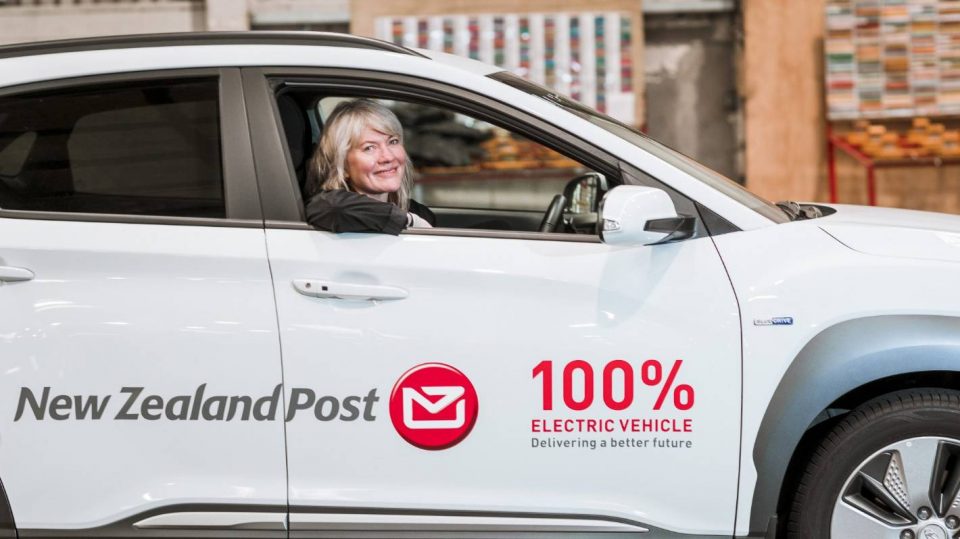People want their online shopping fast, but they may not realise how much their impatience heats the climate, says New Zealand Post’s Head of Sustainability Dawn Baggaley.
Q. You’ve set a goal of being carbon neutral by 2030 for your own and your suppliers’ emissions. What are your biggest sources of emissions?
A. 95 per cent is fuel and only 5 per cent is our energy in our buildings and waste. We’ve got a lot of contract drivers, and courier drivers, so it’s planes, trucks, vans and cars.
So that’s the bulk of our focus [for being] carbon neutral for 2030.
Around 40 per cent is air freight. By 2030, we will be buying offsets [because], essentially, of that 95 per cent, roughly half is in an area we can control, that’s the vans and trucks.
The airfreight piece, we can’t tackle at the moment. We imagine that, if our profile’s currently around 110,000 tonnes per annum, there might still be around 80,000 tons left to offset by 2030, unless something changes there.
READ MORE:
* Diesel, batteries and biofuels: Setting our ferries on course for a green future
* Not Government’s role to pick and choose winners and losers of the energy sector
* New Zealand in 2050: The scenario if emissions are curbed
I was surprised to learn you own your own planes!
We have a small number of planes ourselves, for domestic (freight) and that’s under a joint venture with our competitors.
But the majority (of emissions) comes from our commercial partners. So the Air New Zealands and the Singapore Airlines, whoever we are working with to shift international packages.
ROSA WOODS/Stuff
Dawn Baggaley says NZ Post is offering to split the cost of EV vans with its contractors.
A lot of things come into the country on passenger planes.
With Covid, that’s changed… we’ve had to put some things on sea freight, which has a lower emissions profile. There have been some positives with Covid, because a lot of the airlines have had to retire planes early because they don’t need them, which means, when things start to kick off again, they will be in a position to buy more sustainable planes.
But the big ticket item will be when commercial airlines start to make changes to using sustainable fuels or electric planes.
Andy Jackson/Stuff
People shopping online care about sustainability, but they also want their parcels here and now, says NZ Post.
But you’ll offset the emissions from your airfreight suppliers?
That’s what we’ve promised. We’ve started to look at what that means and it looks quite a big, hairy, audacious number, with challenges around availability of quality credits, and the price of a ton of carbon, so we’re doing some work that we will present to our executive team and the board.
What about land transport?
We’ve already got 450 Paxters, those are those little buggies that deliver your mail.
For the vehicles we own, we’ve got an EV-first policy, so when they come to the end of their life, we’re going for an electric vehicle, where possible.
We recently launched an EV incentive scheme for courier drivers. They are contractors, they own their own businesses, so we put a lot of effort into helping them understand the benefits of electrification. If they wanted to transfer to an electric vehicle, we… pay a minimum of 50 per cent of the difference to shift.
The barrier there is largely the availability of suitable electric vehicles. The Renault Kangoo is really cool for a lot of our rural drivers, the range and the size of it.
All the projections we’ve looked at show there will be a lot more models available very soon, and we’re going to hit a tipping point in the next couple of years when price will start to come down, which means the money we have to help incentivize them will go further.
ROSA WOODS/Stuff
NZ Post’s Dawn Baggaley says fuel emissions from trucks, cars and planes make up virtually all the company’s impact.
The next thing is the long-haul (trucks). We’d love to try alternative fuel trucks, and we don’t yet know if this is going to be hydrogen or electric.
Could you use biofuel?
I’m not sure what’s going to happen with biofuel. The good thing about biofuel is, we can use it in existing vehicles.
But there’s uncertainty. A few years ago [Z Energy] came to us and said, would we support it? And we were keen to use it, even if it costs us a little more. [But] they’ve had issues with the price of tallow. In other countries, tallow is subsidized, so it’s going overseas, and that seems kind of crazy. (Editor’s note: Z’s Auckland biofuel plant is currently mothballed].
Your website talks about avoiding multiple redeliveries as one way of cutting emissions. Are there things people like me can do to reduce our impact? Do I need be more patient so my overseas parcels can come by sea?
Well, the majority of our customers are not you, they are the big e-tailers… we’re serving their customers.
We do lots of market research around what’s happening with online shopping, and… we know [people are] still concerned about sustainability. But… the trend at the moment is, we want it now, want it urgently.
And maybe there’s something (needed) around educating customers or giving them options.


